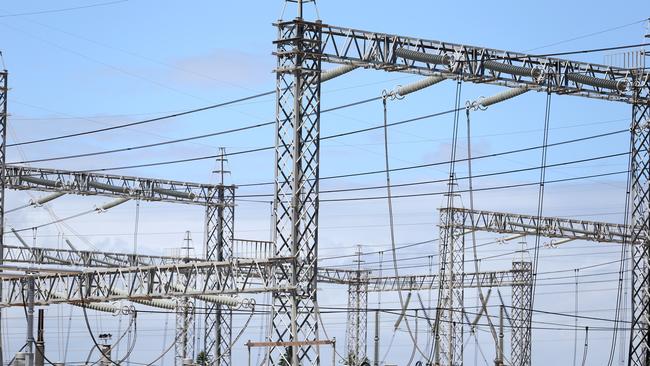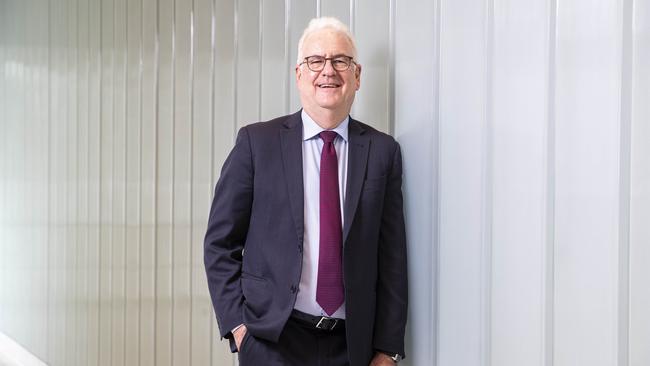AGL boss Graeme Hunt still has work to do ahead of vote on demerger

Last weekend was the second weekend in a month that AGL chief executive Graeme Hunt and his board spent making sure that the demerger plans stayed on track.
The Brookfield-Grok consortium, where the Canadian fund manager has teamed up with Cannon-Brookes, increased its initial bid from $7.50 a share to $8.25 a share. When AGL knocked it back, the bidder walked away.
“They’ve said pens down, whatever that means,” Hunt said.
Each side sees the other as not willing to engage properly. Hunt says the two bids represent a slim 5 per cent and 15 per cent premium to the AGL share price trading range from just after the company’s half-year results (which have been buoyed by rising wholesale prices).
Hunt has not told the bidder what price would be in the ballpark, nor will he be drawn on a number. “Talk to any investment banker. They will give you a sense of what the usual premium is for this kind of transaction and it is well north of where this is,” Hunt says.
The AGL chief sees the bid as opportunistic: buy 4.5 million energy customer accounts on the cheap, along with a short energy position that would allow Brookfield to drive more investment in generation and transmission infrastructure.
“They would make a huge amount of money out of that. They wanted to get in before the demerger in order to avoid the competition around that and to try to get a lower entry price,” Hunt says.

Brookfield’s Stewart Upson freely admitted on day one of the campaign that the bidders were pouncing early to get ahead of the competition.
The big Canadian has gone to ground although note that Mark Carney, head of transition investing at Brookfield, is speaking at a conference in Sydney this week.
Cannon-Brookes describes the demerger path as a terrible outcome for shareholders, taxpayers, customers, Australia and the planet.
“Shareholders now vote on that path,” Cannon-Brookes wrote on Twitter, pointedly.
Even without Brookfield breathing down his neck, Hunt has work to do. In May, the AGL board must convince 75 per cent of shareholders that the demerger will deliver value for them. And about 60 per cent of those shareholders are retail investors.
In recent months, almost all AGL’s big institutional investors, including Vanguard and BlackRock, have sold down, leaving largely quant funds on the register.
ETF fund manager VanEck has raised concerns about ESG ratings for Accel, which will hold the coal-fired generation, and it questioned the investor support. Others remain sceptical that AGL can execute without raising equity.
Hunt insists the response from shareholders since the February half-year result has been positive and fresh equity is not needed.
In January, AGL launched an energy transition fund for Accel seeking investors to help fund 2.7GW in renewable projects. “The most important thing about the energy transition is the access to projects,” Hunt says. “We have projects both on the Accel and the AGL Australia side. There is plenty of capital available in the market to drive that.”
Hunt must win over both these new investors and retail shareholders to pull off his defence.
He says cashflow will be strong from AGL’s coal-fired power, the lowest-cost thermal generation in NSW and Victoria. “We are not like some others that have had to retire earlier as much as anything based on their cost base,” he says.
This sort of language is an anathema to a climate warrior like Cannon-Brookes. He announced during the takeover process that AGL’s coal generation would be shut by 2030.
It is a good bet there is strong overlap in AGL’s retail shareholders and AGL retail customers, something that Hunt will be reminding shareholders.
“If you take out the lowest-cost energy production in both states too early, what you leave is high-cost production that leads to higher electricity prices. There is no way around that. There is a practical limit about how fast you can go and doing all that by 2030, we just don’t think is possible,” he says.

There is risk, however, to Hunt’s expectation that rising retail electricity prices will help AGL. The government now has form on price-cap intervention.
Brookfield has not gone away. It could be back at the table if the demerger fails. It could also be there after the demerger.
Cannon-Brookes is on a mission to eliminate coal-fired power, so Accel is in his crosshairs. Whether the transition challenge and the capital challenge of Accel without the huge retail portfolio holds the same attraction for Brookfield is another question.
Beyond a tweet from Cannon-Brookes, there is no intelligence on why Brookfield is walking. It may be that a categorical “No without tea or coffee” from the AGL board was all it took.
But investment risk always comes with a price ceiling. In an election year, the chance of government intervention or regulatory roadblocks is all risk.
Last week, Australian Competition & Consumer Commission chairman Rod Sims noted that a takeover of AGL could leave Brookfield with both energy generation and poles and wires after its successful takeover of AusNet, the issue being that the generator could favour its own energy for transmission.
Brookfield now only owns 45 per cent of AusNet with other institutions. And Sims also noted the tough Victorian regulatory regime. Then again, Brookfield has ambitions for AusNet beyond Victoria.
Less explored is what the national energy market would look like with a Brookfield-Grok takeover of AGL. It would make them owners of the largest retailer of energy, with a suite of renewable energy generation, transmission in Victoria and owner of some of the prime locations for energy storage next to the grid.
In a future of 100 per cent renewables and storage, that’s quite a vertical.
Brookfield can argue that the various assets would be bought by very separate funds within the group. That same argument has been successfully won by the industry fund sector in its bid for Sydney Airport.




If he chooses to take up his pen again, Mike Cannon-Brookes could prove influential in AGL’s upcoming vote by shareholders for the demerger of the business.